![]()
The Words of the Pak Family
|
|
The Words of the Pak Family |
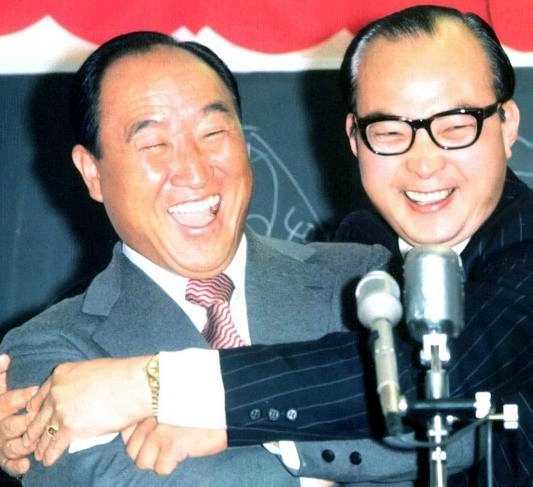
I was a soldier. I met Father as a soldier. I had fought in the Korean War for three years. During the war, every day we faced the danger of losing our country; the situation was dire, especially in 1950. We were pushed all the way down to the Naktong River, near Daegu. I was a soldier on that defensive line. We were deeply grateful that Douglas MacArthur launched the Incheon Landing that reversed the war situation. We were on the winning side and were moving north, all the way to the Yalu River. We had virtually united the country at that time, if only the Chinese forces had not entered the war and in the most incredible number, enabling them to push us back down to the south.
Father was in prison. For us, the Korean War was a holy war because it had two purposes: First, to defend the country and create the Republic of Korea, which has become a significant country in its own right. Second, the war occurred to protect the Messiah's life, which the communists had threatened.
The North Korean police had arrested him. Although he was without sin, without any misdoings, the communists tried him and sentenced him to five years' incarceration in Hungnam Prison.
There, the inmates developed a special feeling toward Father. Even the prison guards had some fear of dealing with him. Father never did anything wrong or was unkind in word or deed but the guards knew he was an exceptional person.
This was the situation: Father, like everyone else, was extremely hungry. When dinner came -- a bowl of rice or barley -- Father initially (for six months) gave half of his food to a severely weakened inmate. Father ate only half and the weakened inmate was able to eat his own and half more.
It was impossible for Father to survive under those conditions. Truly, Father survived spiritually; spiritual power, spiritual energy, kept him alive. Father's mother, in Pyongyang, always prepared food for him. Food was the most important thing in that prison. She would roast barley or rice in the way that coffee is roasted and then grind it into powder. Just a spoonful of that powder with water provided good nourishment.
Father was always in his shabby prison uniform. In his mother's mind, this was so pitiable and sad. She made clothes, wrapped them in a bundle and carried them with the rice and barley powder on her head for the six hundred mile journey. She then met her son, Rev. Moon, whose birth name was Yong Myung. Yong Myung, she said, Don't give it to anybody. Eat it yourself, slowly, spoon by spoon. Keep yourself in good health.
That was his mother's only wish. She gave that and the clothes to her son, who while his mother was still there opened the gifts and gave the good clothes to the poorest, most suffering inmate. The powdered rice and barley he distributed among the inmates.
His mother's heart broke. She saw this as it happened and at that particular moment, she hated her son. She had put all her energy and had spent precious money, investing everything to make up the package for her son, who immediately distributed it to others. His mother never understood.
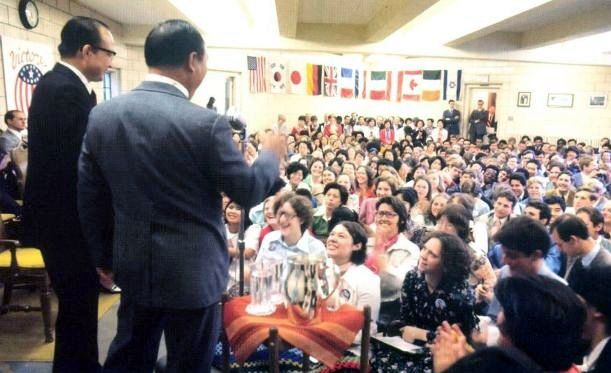
When we went to Father's birthplace in North Korea in 1991, at the graves of his mother and father, I overheard Father speaking to his mother.
Mother, I'm sorry I made you suffer, but now that you are in heaven, you know who I am. I am not just your son. I am Heavenly Father's son. I am aware of my duty to Heavenly Father, so I could not feed myself and make myself happy. I had to labor twice as hard as other inmates did to reach our quota when others could not fulfill their portion. I could not think of myself alone.
Why am I telling you this story, which you may have already heard? To me, it showed that Father was already the Messiah. To live as the Messiah in every way under those conditions is what made Father the greatest. Afterward, Father did so much in the United States, in Korea and in Japan, but I am telling you this story first because Father's messianic essence was apparent even then and his suffering in those days was the most messianic. He was a messianic personage.
His messianic character showed at that time. For that reason, the Korean War came. Heavenly Father made the Korean War happen -- the United Nations Forces, the Incheon landing and the move to Hungnam. The opening of the prison gates on October 14 happened because that very day Father was supposed to be executed.
At that time, Captain Alexander Haig, under Gen. MacArthur's command, opened the gate. Therefore, Father had a close friendship with General Haig. I did too. I knew General Haig very well from when he was White House chief of staff under President Nixon. He went on to become the Secretary of State. When he was an Army captain, he saved Father.
Therefore, when Father deceased on September 3, 2012, I couldn't believe it. I always thought that Father would live more than a hundred years, because he was born so strong,
God had made him so strong. Father was taken up to heaven for a dispensational reason, not because he was weak or had become old. He had said he would live for over a hundred and twenty years. He was fully capable of doing so because... I was so sad. Father's passing was unexpected. I was so grieved. I could neither sleep nor eat for several days.
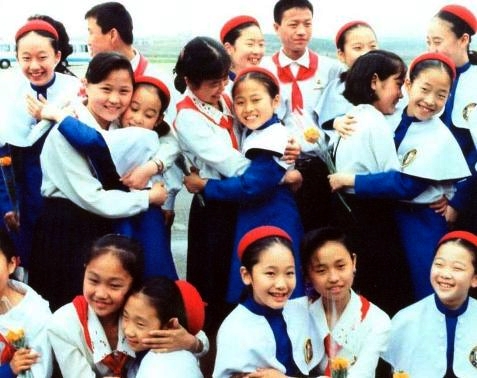
Another remarkable deed of Father's occurred after his release from prison. He was freed in the midst of war, but he did not come to South Korea. He went to Pyongyang.
In the two years and eight months that Father had been in prison, without his preaching Divine Principle, he gained twelve disciples that pledged loyalty to Father, saying that they would live and die together. This was another aspect of his messianic character. Eleven of them left Hungnam at the same time but went in different directions, many of them only to meet their death. None of them actually remained disciples.
At the time that Father gained his release on October 14, 1950, nearly three years had passed since he had left Pyongyang, where he had had a congregation in quite a booming church, before the Communists pummeled the churches. Father went to Pyongyang to visit the members' homes. He missed every member in a way similar to a shepherd's feelings toward his flock; he went to look for each of his lambs in Pyongyang. As it happened, they had already fled from North Korea -- all except one, Jeong Hwa Pak, a large man that was in prison with Father but that had been released earlier.
He had broken a leg in an accident and could not escape North Korea. Father told him they were going together to the south. Mr. Pak protested and told Father not to worry about him. He said, If you try to take me to South Korea, you'll die and I'll die; we'll never make it with my broken leg.
Father insisted. He and Jeong Hwa Pak had pledged to live and die together. They had to do it. So, Father got an old bicycle and he, Mr. Pak and Won Pil Kim -- one of Father's earliest disciples -- left North Korea. They could not take the main roads because the military was using them. They followed country roads, or at times, no roads at all. Through incredible terrain, Father and Won Pil Kim pushed Mr. Pak, but the poor bicycle could not last even three days. Mr. Pak weighed 90 kilograms. The bicycle could not stand it.
Father carried Jeong Hwa Pak on his back and walked and walked through South Korea's rugged mountains. It took many days. This also shows how strong a man Father was. He weighed eighty kilos and carried a man weighing ninety on his back as he walked. He didn't even have proper shoes. How can you expect Father to have proper shoes to travel in when he had just come out of prison in rags?
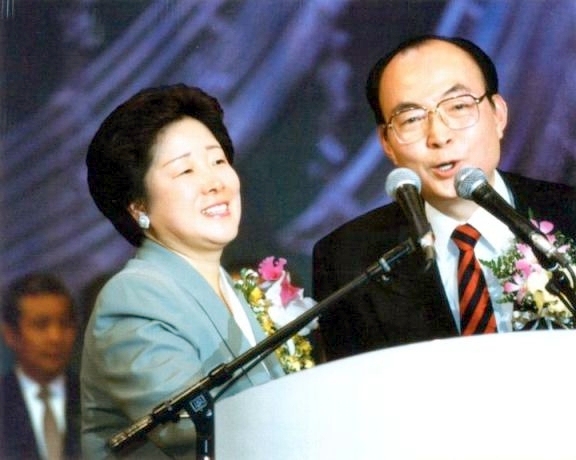
From time to time they'd stop at a village where people waited for Father with food and kimchi and rice. They'd had dreams, in which perhaps some grandpa appeared saying, An important guest is coming to your house. Please prepare some food. On many, many occasions, that is how Father survived.
I'm sure you've heard this story, but I am telling it because it so moves my heart! For me, this expresses so fully Father's messianic essence. I became a member of the Unification Church after learning of Father's ordeals in prison and the deeds he had done.
The war ended in 1953 and four years later, I was still serving in the military. I had no freedom. I was unaware that the Messiah was on earth. I served as a military assistant to U. S. Army General Willis S. Matthews, chief of KMAG, which was supporting the entire Korean Army. He had a Korean counterpart, the Korean Army Chief of Staff. The two of them worked together; one supplied the materiel and the other trained the soldiers. I was General Matthews' special assistant.
Near the KMAG office was the Army Chaplain's Office, where Young Oon Kim, once a professor at Ehwa University, worked. From the chaplain's office, she sent me an invitation to a philosophical lecture that I might be interested in.
During the war, I had many questions: What is death? What is life? What happens when I die? What comes after that? Is something there, or nothing?
I had been looking for something. I went to the place designated by her, where Professor Kim welcomed me with a beautiful smile. We sat across from each other with a small table between us. Until the midnight curfew that we had in those days, I listened to part one of the Divine Principle. She was an experienced lecturer. She abbreviated and gave the most critical parts to me. Amazing!
I was most impressed by the section on Jesus Christ not having come to die. Lack of faith and misunderstandings led to the crucifixion. The crucifixion was not God's will. I was utterly surprised. Another surprise that first night was there being life after death. This is not the real life. I couldn't believe that! This is the only life I have, and you say it is not the real life. Where is the real life? "Don't worry," she said, "It will come."
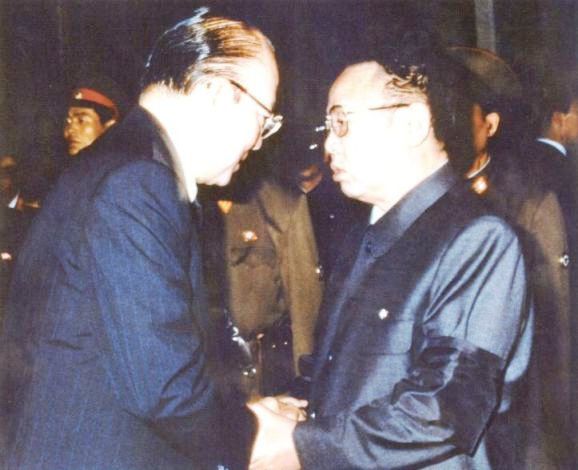
July
14, 1994: Dr. Pak was one of the few South Koreans to meet Kim Jong
Il when he represented True Parents in offering condolences after the
death of Kim Il Sung
On the first night, part one; on the second night I listened to part two of the Divine Principle. In two nights' lectures, I was fully convinced that God had given this teaching to some great man who had taught it to her and that she was now transmitting it to me. I told her I wanted to meet her master. She responded that I shouldn't be in such a hurry. Actually, thinking of our modest church at the time, she was afraid that I might be a materialistic person that would judge based on the appearance of the church and conclude that it was not for me.
She told me neither the name of the church nor its location. This made me kind of mad. I was a military officer, though, so discovering later that Young Oon Kim attended the Unification Church in Cheongpa-dong was not difficult for me.
I found the church myself. She had told me not to worry about going to their service, but I went anyway, on a Wednesday night. I didn't see a steeple in the area. I didn't see a cross. I asked a woman selling vegetables which way I should go. The Unification Church was oppressed, persecuted and misunderstood at that time. Even the vegetable seller knew that, but she simply told me which alley to go up and which small door to use.
It was not a church building but had once been a family home. I removed my shoes before I entered the sanctuary.
The date was February 17, 1957. No heat came from an unlit wood-burning stove. It was very cold.
I was well dressed that day, in my military uniform, it being the first visit to my church. I sat in the front row among roughly fifty humbly dressed young people that were singing hymns, holy songs. The singing struck me. It was not the normal church singing. Someone stood, leading the songs, while without musical accompaniment everyone else sat on the floor and sang from deep within themselves. They sang powerfully.
I don't remember who gave the sermon or what was said. What I do remember is that after the service, the man sitting next to me, who was commonly dressed, wearing a U.S. Army jacket stood up and went to the front. Though he had sat through the service with a Bible in front of him and joined with others in all the songs, he now proceeded to speak powerfully. This was not a sermon. He was giving instructions. You do this; you do that. Have you done that? What about you? All right, from now on you do this, this and this. Wide-eyed I watched. Who is this man?
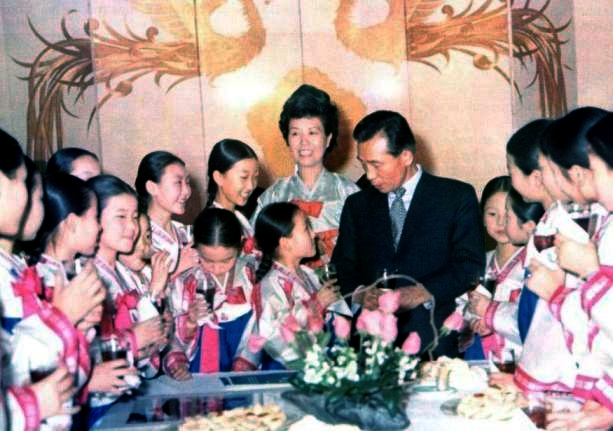
The
Little Angels, with whom Dr. Pak has a long association, offered the
world a view of Korean culture and traditions at a time when
controversial military strongman Chung Hee Park was trying to guide
the nation out of poverty and protect it from North Korean invasion
I had thought that the man I would later learn was Hyo Won Eu, the only person sitting on a chair, was the church leader. Moments after the man stopped speaking, Young Oon Kim appeared. She introduced me to Father, who smiled and shook my hand, saying he had heard a lot about me. He invited me to his room to talk some more. There, I did a deep bow to Father, fully realizing that this was the master, the bringer of the Divine Principle. That, I understood immediately. Only later would I realize he was the Messiah. That day in his room, I knew he was a great man. I stayed until twelve o'clock, listening, learning his teachings. That was my spiritual birthday.
So far, I have spoken to you about my own experiences, how I met Father and became a member of the Unification Church. These two volumes are full of my experiences since that day. That is my history.
Then, on July 3, 2012, Father passed into heaven. I collapsed, not physically devastated but thoroughly sad, because my belief had been that Father would live more than a hundred years. I had personally expected him to live to more than a hundred and twenty years of age.
I understood that this was a dispensational call by Heavenly Father, who needs True Father in heaven to control heaven and earth. We are now in this stage. True Parents are still controlling our church, with Father in spirit and Mother on earth. The Father -- Mother True Parenthood is still there. They are assisting each other. Through their strong unity, Mother is carrying out great reformation. Mother has been doing so well in her leadership. She has already accomplished so much.
Members are so excited to enact Vision 2020. Until that target date, we are trying to accomplish as much as we can. I am lecturing to university students. Twice already, I have done this, and I will do more after university summer vacations end. I am also going to speak in Japanese to 160 Japanese members that are to become missionaries after training for forty days. It is my great honor to speak to them at the end of August, during the last part of their training.
Father was a truly living patriot. As a Korean, aside from his messianic position and his great, universal missions, Father loved his country. His motto was love God, love humanity, love the country. He loved Korea particularly because Korea is a heavenly country; it has gained a central position. Father has the ideological view of Korea as Heavenly Father's kingdom, right here, first. Therefore, Father's patriotism was potent. That is why he was a very strong anti- communist. Father feared most that Korea would become a communist country.
We had to do everything possible to stop communism from taking over this country. Yet, saving Korea alone would not work. We had to save the United States first.
The U.S. might have become communist during the Carter period as a result of the Soviet strategy under Brezhnev. Father went to the United States because he had to save the United States. And he did! Together with Ronald Reagan and George Bush, he completely liberated the Soviet Union. This was Father's greatest accomplishment.
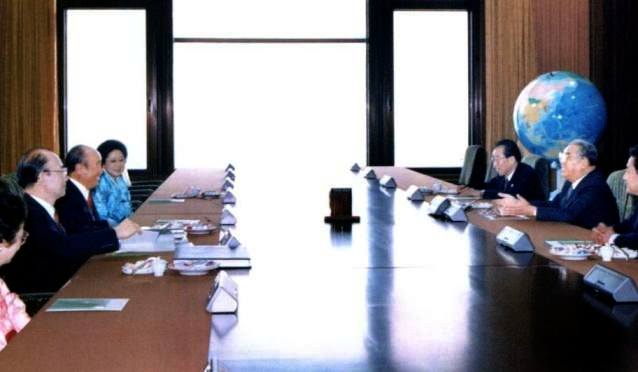
Dr.
Bo Hi Pak and his wife Ki Sook Yoon with True Parents as they hold
discussion with Kim Il Sung in North Korea; none of the North
Korean's wives were visible during their seven-day visit.
The most important period in the cold war era covered the two terms, eight years, under Ronald Reagan, which were followed by four years under George Bush. Many things happened during those years. Without the Washington Times, without Father's input, the liberation of the Soviet Union was not possible.
With the collapse of the Soviet Union we at least restored normal peace today. Korea has lived through sixty years now without war. This never would have happened. This is incredible.
I want to speak a little bit about Father's various roles. He was a good hunter and loved hunting. I went hunting with him once for pheasant on Jeju Island. From Father I learned for the first time how to hunt pheasant. I took two pheasants myself. Incredible: I never thought that my shooting could bring down a pheasant. It seemed to me impossible. Father was perfect. Every time he saw a target, he got it. He was a great hunter. He would have loved to hunt big game, to go on safari, but he never pursued that. He simply liked hunting with members for pheasants or boar or rabbits.
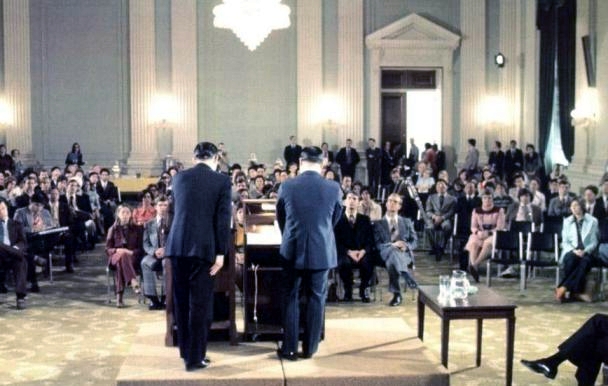
But Father was not primarily interested in hunting; he was most interested in fishing. He was the world's fishing champion. He fished in Alaska for giant halibut and mainly in the Boston area for Bluefin tuna and giant tuna.
We learned something important from Father through fishing. He put his heart and soul into everything he did. He considered sports he did, even hunting and fishing, providential missions. He did everything in that fashion, investing his entire heart, soul and concentration into it.
He had a fishing boat in Alaska and one in Boston. He would start out very early in the morning and stay at sea until very late. Assisting Father all day long was not easy. Huh! It was impossible for anyone. Men like me felt stressed out by the middle of the day. Tuna fishing is like war; yet Father kept at it.
He had devised his own way, not the normal way, of fishing for big tuna. He had studied bait and used his own type. He used not just one fishing rod; he had a dozen. He sat like a commander-in-chief in the commanding position at the back of the boat. He would sit in that chair all day long. When tuna were biting, he immediately knew and war began.
Tuna are so large, powerful and warlike; they pull the boat around for many miles. Father let the tuna do all that swimming; he did not resist. Okay. Let's go! Let's go! By the end of the day, when the tuna was tired out, Father would begin pulling slowly, but as the tuna came near (Oh, yeah!) he would begin to resist again. Fighting a giant tuna can tire two or three men pulling together. Gradually, Father proceeded, always cautious not to lose the tuna. Going tuna fishing with Father was an extraordinary experience, a unique kind of war. I fought in the Korean War and I witnessed another war fought on the sea.
As a fisherman, Father was a legend, a truly expert fisherman, but not in a way that made sense to the regular sports fisherman's world. His way of attacking tuna was providential. He felt that landing a tuna was a victory that indicated that another victory in a Divine Principle sense, a providential sense, was coming. He felt he was setting a condition for members around the world.
Businessman: I must tell you, Father was not a businessman. He worked with many businesses but he did not do business in a businessman's way. He did business only for the sake of Heaven. Under those circumstances, Father always operated on a large scale. What he did -- whether it was in manufacturing, like Tongil Industries, or the fishing industry in Alaska -- had a providential purpose. In Alaska, they did commercial fishing. The boats went out and came back once their nets were full of fish, tons of fish. We developed the means to dry the fish into a powder form and tried to give it to people in desperately impoverished countries to provide nourishment. That was how Father thought. Doing business always had some providential connection. Father was not a businessman, but he did the part of God's work that included business. I look at it that way.
Public speaker: I know this part very well. I enjoyed and I suffered through this part. I enjoyed it because interpreting for Father was a great honor and it was such a great joy. However, a good interpretation of Father over hours and hours and hours was torture. Normally, the shortest speech was three hours. That was a peanut. Then, six hours became normal; then, ten hours. Father came to Washington once and spoke to members for thirteen hours. I wanted to go to the bathroom so bad, but Father would not give me a visa. I was battling on two fronts, interpreting and trying to be patient, trying to resist the physical urge to go.
I will tell you an amusing story. In each city on the Day of Hope Tour, we always spoke on two nights; the first night at a banquet and on the second night at a full public speech. On the second night in Iowa, many people came. It was a good start, but that day, I had bad diarrhea. I always prayed to Heavenly Father to ask him not to give me diarrhea. I would tell him I would rather go through a fast than have diarrhea, though of course, diarrhea and fasting are unrelated. All of a sudden during the speech, I became pale, very pale. Father looked at me and he knew that something bad was happening in Bo Hi Pak. He said in an undertone, Bo Hi, you go. Go to the bathroom.
I was trying to withstand the diarrhea and keep to the mission. Father said, Go to the bathroom, so I went to the bathroom without saying anything to the audience.
In English Father told the audience, I would like to sing you some beautiful songs; I hope you enjoy them. Father was a great improviser. He understood the public. Everyone said, yes! and he began singing. After one song, everyone applauded. He sang a second song to more applause. Father began to enjoy singing. He had to sing a third song because I had not returned. I ran to the bathroom. I had bad diarrhea. My underpants were all wet.
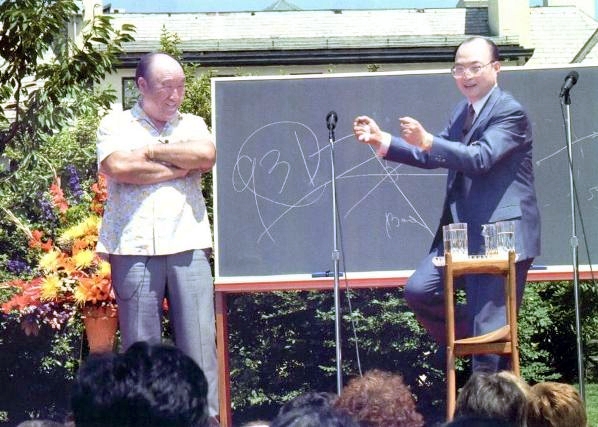
Luckily, I had such great brothers around me. One brother was aware of my problem. He followed me to the bathroom. He went into the next stall and took off his own underpants. Incredible! Through a space at the bottom of wall dividing the two stalls, he handed them to me, and they fit perfectly.
That morning I had put on thick underpants because of the weather. My trousers and suit jacket were fine. Only my underpants were soiled. Those I threw in the garbage, and then I deeply thanked that brother.
After that episode, I returned to my podium. By that time, it had become a much greater rally. You don't often see that kind of excitement. Father had delighted the whole audience. Joining in the excitement, I said, ladies and gentlemen, I want to tell you the full story.... (Of course, I did not tell them what the brother had done.)
Everybody clapped and clapped. Father began to talk and I resumed interpreting. That was the greatest success on the tour and was one of the most memorable Day of Hope nights. Many times I suffered because I needed to go to the bathroom but was not able to. My one big accident happened in Iowa.
Father was such an excellent and a powerful speaker. When he was mad, he showed the wrath of God, heavenly wrath, such as when he attacked immorality. Father was powerful. His gestures were powerful. But he was also humorous.
Do you know what he said to the United States Congress? He said that America must become a moral and God-centered country. America is now debauched; she has departed from the original dream of George Washington and the Founding Fathers. Today's America must become as God wants her to be, doing God's will. That was his speech to Congress, which was very well accepted. The congressmen gave Father a standing ovation.
Marriage counselor: No one could do marriage counseling as well as Father. He was the best in the world. All Father had to do was look at faces and he could see all the ancestors and the family members.
Organizer: Oh, boy. He was not just an organizer. At big rallies, like at Washington Monument and Yankee Stadium, he was a commanding general. When the commanding general checks the organization, everything will be rehearsed fully beforehand. He was a perfectionist; he wanted to see things done to perfection. For example, sound: In the middle of a speech, did we ever lose the sound? That never happened under Father.
World traveler: He was a world traveler but not in a secular sense. Can you imagine going to a different country and giving a public speech every day for a hundred days? Could you endure that schedule? Father did that once by himself and a second time Mother and some of their children took some of the countries. You will not find another world traveler like Father in all of history.
Inter-religious harmonizer: He had no conception of prejudice. We were persecuted by other religions, but Father never responded. "You said bad things about us so I'll say bad things about you" was never Father's way. He did not engage in that.
My hope was to honor Father on this first anniversary. Tears still drip down when I think of Father's untimely departure. He could have lived for ten more years at least. Physically he was able, so I must conclude it was a heavenly dispensation. We must accept Father's will and obey Mother. We must work hard in pursuing Vision 2020. By 2020, we must enable Divine Principle to reach all corners of the world.